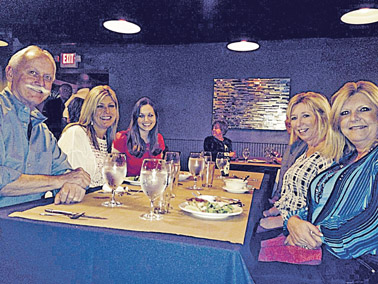ALACHUA COUNTY – “I know how to do things myself,” said 84-year-old Alachua resident Frank Bryant. “I’m just too old to climb ladders anymore and fix things around the house on my own.”
That’s where Rebuilding Together North Central Florida (RTNCF), a non-profit volunteer home repair organization, stepped in to help.
RTNCF is dedicated to addressing substandard housing needs throughout Alachua County at no cost to the homeowner. The group focuses their attention on critical repairs needed to make a house safe and healthy for the family living in the home.
Bryant had nothing but praise for the work they did to help keep him safe and in his home.
“They were very professional,” Bryant said. “Their work was excellent and they explained what they were doing and why.”
RTNCF not only cut a water-tight walk-in entrance into his tub and installed handrails, but they also reset his toilet to a better height and replaced deteriorating wooden siding on the back of his house near ground level.
“I’d probably still be struggling to get in and out of the tub if they had not come to help me,” he said. “Now, I don’t need help to do the things I need to do.”
Last year, the group completed 25 projects. Roof repairs are one of the areas they tackle, although many organizations do not take on that level of repair work, said R.D. Bonner, RTNCF’s director of programs
What the volunteers usually do is secure the perimeter of the home to make sure it is water tight, improve mobility and accessibility, sometimes by installing ramps, make bathroom modifications, complete tub and shower conversions and install seating in showers and grab bars wherever needed.
“We want people to be safe and healthy in the homes they love,” Bonner said.
Many of the organization’s volunteers have been with the group for several years and have had training and experience in several areas of home repair. The group also has skilled trades people who volunteer their time to either train volunteers in specialty areas or provide services to homeowners that require licensed repair services.
“We have a great outreach program,” Bonner said. “The work we do is only possible because of the large amount of community support we receive.”
The program started as a grassroots group of concerned individuals with a focus on Gainesville in 2005. They called themselves Rebuild Gainesville at that time. One of the group’s board members discovered an organization called Rebuilding Together in 2008, which had a network of organizations throughout the country working toward the same mission, but on a larger scale. At that point, they joined the larger organization and reformed as Rebuilding Together North Central Florida. The group now serves all of Alachua County instead of just Gainesville.
“We were able to take on more projects and help more people as part of Rebuilding Together than we were able to help previously,” Bonner said.
Around 500 volunteers participated in improvements to homes during 2013, he said.
Today, RTNCF remains non-profit and gets most of its support from the community. The organization is made up of local businesses who pledge corporate sponsorship, concerned individuals and local tradespeople.
According to their website, their mission has been to “bring volunteers and communities together to improve the homes and lives of homeowners in need. These services are intended to keep homeowners safe and healthy in their homes.”
“We pair up an experienced volunteer with a new volunteer to make sure the new ones get the training they need for the work they are performing,” Bonner said. “It’s a great way to meet new people and learn all kinds of great skills.”
“Everyone involved in our organization comes away from the experience with more skills in repair and maintenance,” he added.
The group has two windows of opportunity for homeowners to submit applications for help. One just closed on Friday, Jan. 17, and got 82 applications. The other begins in early June.
“We only take applications for two weeks each time,” Bonner said. “We only have a very small staff and that’s about all we can accept at a time.”
The group can do critical repairs to about 25 homes a year, he said, but could do more with additional money and volunteers.
“Participation in the organization makes it easy for people to help their neighbors,” Bonner said. “That is something many people would like to be able to do, if they only knew how. This is one way to accomplish that goal.”
# # #
Email cwalker
@ alachuatoday.com
Add a comment

